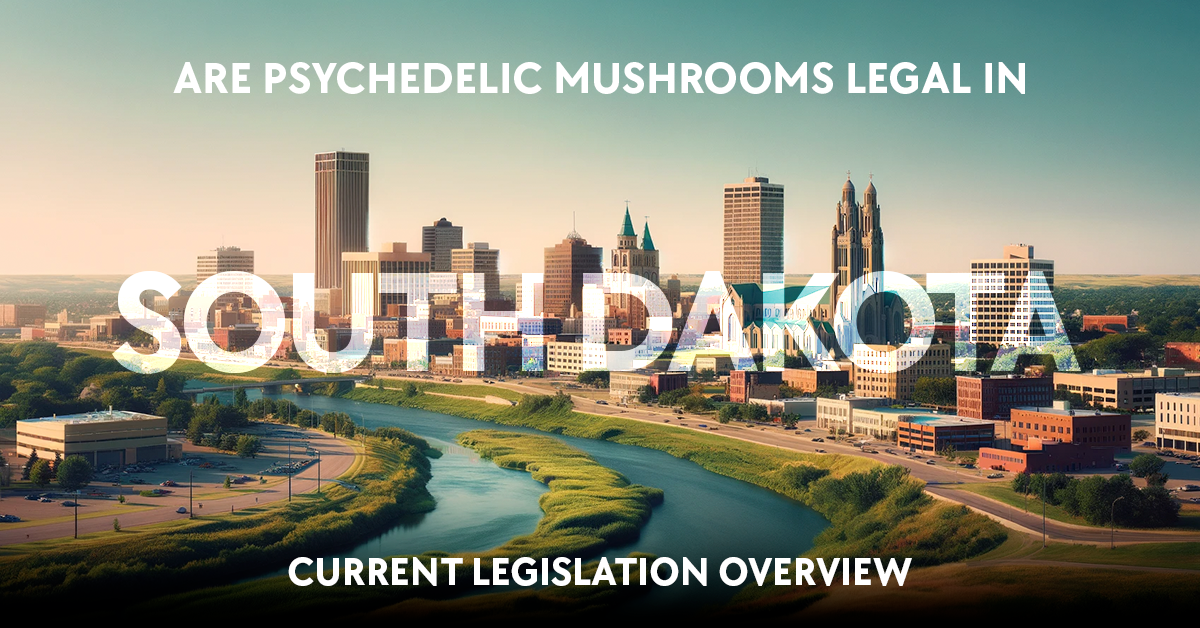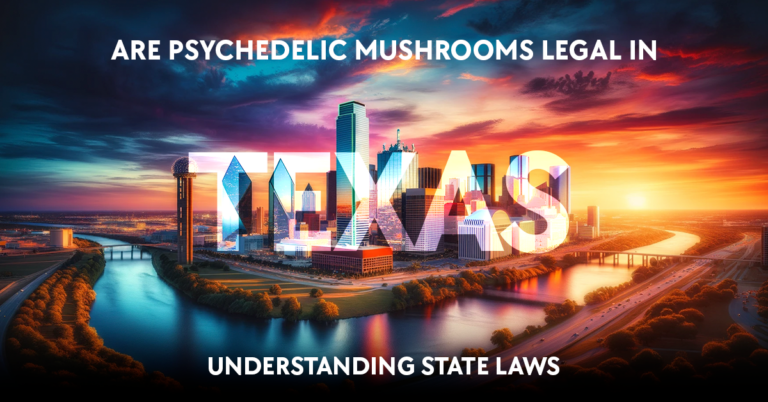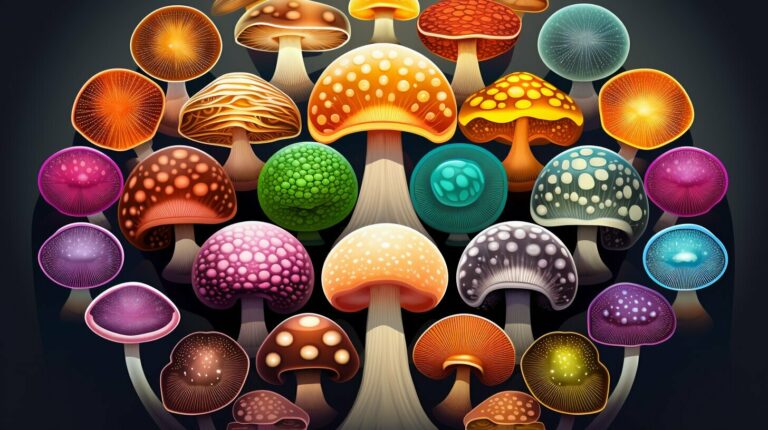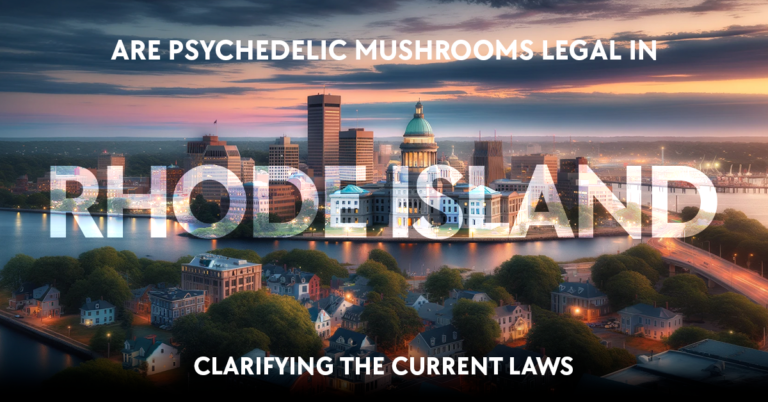Psychedelic mushrooms, often known as magic mushrooms, contain psilocybin, a naturally occurring psychoactive and hallucinogenic compound. While the effects of psilocybin are sought after by some for their potential therapeutic benefits, the legality surrounding these mushrooms remains a complex issue. You may be wondering about the legal status of psychedelic mushrooms in South Dakota, considering both state and federal regulations.

Historically, psychedelics like psilocybin have faced strict prohibition, and despite a growing interest in their medicinal and psychiatric potential, they remain classified as Schedule I controlled substances at the federal level. This classification indicates a high potential for abuse and no accepted medical use, making their possession, distribution, and cultivation illegal. In South Dakota specifically, state law mirrors federal legislation, maintaining a stance that prohibits these substances.
Recent trends show a shift in the public perception of psychedelics, with some jurisdictions considering or enacting policy changes. However, within South Dakota, psychedelic mushrooms are still illegal for recreational and medicinal use. As laws are subject to change and vary greatly by region, it’s important to stay informed of the latest legal developments regarding psychedelic substances in your area.
Legality of Psychedelic Mushrooms in South Dakota
Table of Contents

In South Dakota, psychedelic mushrooms, which contain the active ingredient psilocybin, are considered a Schedule I controlled substance. This categorization indicates that authorities view these substances as having a high potential for abuse, no currently accepted medical use, and a lack of accepted safety for use under medical supervision.
Possession
Should you possess psilocybin mushrooms in South Dakota, you would be violating state law. Possession is treated as a serious offense; penalties vary depending on the quantity in question and whether it is your first offense.
Sale and Distribution
Engaging in the sale or distribution of psilocybin mushrooms is illegal and comes with even more severe legal repercussions than possession. If found guilty of these actions, you could face hefty fines and substantial prison time.
Legal Status and Overview
- Psilocybin mushrooms: Illegal
- Classification: Schedule I controlled substance
- Possession penalties: Variable, typically severe
- Sale or distribution: Heavily penalized
Be aware that the South Dakota legal system enforces these regulations rigorously. There is no exception to these rules, even if you were to claim the use of psilocybin mushrooms for personal enlightenment or spiritual purposes.
In recent years, there has been a movement to explore potential therapeutic uses of psychedelic substances; however, as of now, in South Dakota, this does not change the legal status of psilocybin mushrooms. Legislation can change, so staying informed about current laws is paramount for your legal safety.
Historical Context of Psychedelic Substance Regulation
https://www.youtube.com/watch?v=yFTLMvu19Xs&embed=true
In the United States, the regulation of psychedelic substances, including psilocybin, the psychoactive compound in psychedelic mushrooms, has evolved significantly over the years. Your understanding of its current legal status in South Dakota, or elsewhere, requires a glimpse into the history that shaped current policies.
In the 1960s, psychedelics such as LSD and psilocybin mushrooms gained popularity for their mind-altering effects. This prompted the federal government to classify many such substances as Schedule I controlled substances under the Controlled Substances Act of 1970. Schedule I drugs are considered to have a high potential for abuse and no accepted medical use, placing them in the most restrictive category.
The criminalization of psychedelics, including marijuana, LSD, DMT, MDMA, and ketamine, marked a significant shift in drug policy. Despite their historical and indigenous uses, these substances faced stringent legal actions, which persist at the federal level.
In recent years, there’s been a push for decriminalization and legalization of certain psychedelics for medical and therapeutic uses. Cities and states have begun to challenge federal guidelines by altering their local laws, sometimes allowing for limited use.
South Dakota’s stance on these compounds aligns with federal laws; however, the tide is slowly turning as elsewhere leads in reform. The contrast between historical criminalization and contemporary movements toward decriminalization highlights the evolving perception of what constitutes legitimate versus illicit drug use.
State Versus Federal Laws on Psilocybin

When you’re examining the laws surrounding psilocybin, commonly found in certain types of psychedelic mushrooms, it’s important to distinguish between state laws and the federal legal framework. Federally, psilocybin is classified as a Schedule I drug under the Controlled Substances Act. This classification means that at a federal level, psilocybin is deemed to have a high potential for abuse, no currently accepted medical use, and a lack of accepted safety for use under medical supervision.
Despite the federal ban, several cities and states have shifted their stance on psilocybin. The term decriminalized means that while psilocybin remains illegal, penalties for possession are significantly reduced. Legalized, on the other hand, means that psilocybin can be legally possessed and used, often within specific parameters. Your understanding of the legal status in any particular state is essential, especially since state laws can conflict with federal law.
In South Dakota, as conveyed through the exploration of legal and policy implications, psychedelic mushrooms are not legally recognized for medical or recreational use, aligning with federal law. There has been no statewide legislative movement towards decriminalization or legalization.
You should be aware that actively engaging with psilocybin in a state where it remains illegal can have significant legal consequences, regardless of its status in other states or cities. Always consult current statutes or legal professionals for the most accurate information regarding state-specific psilocybin laws.
Psychedelic Mushroom Use and Decriminalization Efforts

Understanding psychedelic mushrooms’ legal landscapes involves recognizing the nuanced movement of decriminalization and the intricacies of medicinal research. While changes are happening at various levels, the legal status can be complex and varies by jurisdiction.
Medical Use and Research
Medical use of psychedelics like psilocybin, the active compound in psychedelic mushrooms, has gained significant ground in recent years. Your interest in this field may be informed by research which shows potential in treating conditions such as depression, anxiety, and PTSD. Clinical trials and studies are exploring psilocybin therapy as a form of mental health treatment, marking a prominent shift toward accepting these substances for therapeutic benefits.
Decriminalization Movements Across the U.S.
Cities like Oakland and Denver have initiated a wave of decriminalization, reframing psilocybin mushrooms as a low-priority concern for local law enforcement, particularly concerning possession and personal use. These efforts have spread to Washington and various other municipalities, shaping a broader conversation about whether to decriminalize or legalize psychedelic mushrooms. Regulation remains a key consideration, focusing on ensuring safety and restricting non-medical recreational use.
South Dakota’s Position in National Trends
As movements to decriminalize and legalize psilocybin make headway, South Dakota‘s stance aligns more conservatively in comparison. The state has no current legislation that permits the medical use of psychedelic mushrooms, and both possession and cultivation remain illegal. However, the national shift could influence how South Dakota and similar states approach the legal status and regulation of these substances in the future.
Impact of Legal Status on Use and Possession
In South Dakota, the legal status of psychedelic mushrooms, which contain the psychoactive compound psilocybin, directly influences their use and possession. Currently, psychedelic mushrooms are classified as a Schedule I controlled substance under state law. This means that both the use and possession of these mushrooms are illegal. The legal repercussions for possession can range from misdemeanor to felony charges, depending on the quantity involved and intent (e.g., personal use vs. distribution).
- Penalties in South Dakota for possession:
- First offense: Class 5 felony, which could result in up to 5 years in prison and a $10,000 fine.
- Subsequent offenses: Potential for increased penalties.
The stringent legal restrictions are intended to serve as a deterrent for use and possession. However, despite these restrictions, individuals may still engage in the use of psychedelic mushrooms, potentially leading to legal consequences.
Addiction to psychedelic mushrooms is less common than other controlled substances, but if you or someone you know is struggling with substance use, treatment options are available. South Dakota provides resources for substance abuse treatment, which can be tailored to individual needs.
Contrary to the legal stance on psychedelics like psilocybin, some research suggests potential therapeutic uses for these substances under controlled conditions; however, this does not affect their legal status for recreational use or possession in the state.
In summary, the current legal framework in South Dakota categorically prohibits the use and possession of psychedelic mushrooms, and being found in violation can result in significant legal penalties. The strict laws encapsulate the state’s stance on controlling psychoactive substances and ensuring public safety.
Legal Implications for Personal Cultivation and Spores
When you consider the cultivation and possession of psychedelic mushrooms in South Dakota, you should be aware that both are illegal. This includes species like Gymnopilus sp. and Panaeolus cinctulus, which contain the psychoactive compound psilocybin.
Regarding spores, while they technically do not contain psilocybin, the sale and possession of spores with the intention of growing mushrooms can be construed as intent to produce a controlled substance. This table outlines key points:
| Aspect | Legal Status in South Dakota |
|---|---|
| Cultivation | Illegal |
| Psychedelic Use | Illegal |
| Possession | Illegal |
| Spore Sale | Illegal if intended for cultivation |
It’s essential to understand that even if you do not actively cultivate, simple possession could expose you to legal consequences. Due to these laws:
- You should not attempt to cultivate or harvest psilocybin mushrooms.
- Be cautious when purchasing spores, as their intended use could implicate you legally.
- Possession of any part of the mushroom, including spores, can be significant in the eyes of the law.
The state of South Dakota has classified psilocybin as a Schedule I controlled substance, which carries severe penalties. If you’re interested in the legal status of psychedelics, educate yourself fully on local statutes and recent legislative changes to avoid unintentional law infringement.
Psychedelics in Mental Health and Medical Treatment
Recent research has increasingly supported the medical use of psychedelics, such as psilocybin mushrooms, as a potent tool in psychedelic-assisted therapy. You may find it compelling that clinical trials are examining the therapeutic benefits of psychedelics for treating a variety of mental health conditions, including depression, anxiety, and PTSD.
Clinical Potential
Researchers suggest that psychedelics can catalyze profound psychological changes, beneficial for therapeutic processes. For example, in medical settings, psilocybin—the active compound in magic mushrooms—has been found to produce significant and lasting reductions in depressive symptoms. You can explore further on the clinical potential of psilocybin as a treatment for mental health conditions.
Guided Therapy Sessions
Psychedelic-assisted therapy typically involves a guided session where you, as a patient, would consume these substances under the supervision of trained professionals. This ensures that your experience is not only safe but also therapeutic in nature.
Therapeutic Framework:
- Preparation – establishing trust and setting intentions.
- Administration – monitored use of psychedelic substances.
- Integration – processing the experience for psychological insight.
Legal Status in the U.S.
It’s important to stay informed about the legal landscape surrounding psychedelics, as it varies by state. Though historically illegal, several regions have started to reevaluate their stance due to their potential treatment benefits.
For instance, while federal law prohibits psilocybin, certain local jurisdictions have decriminalized or made it the lowest law enforcement priority. However, in states like South Dakota, psychedelics remain illegal. Being informed is crucial for your safety and legal protection.
Scientific Developments
The ongoing scientific developments hold promise, notably as certain states consider clinical research on psychedelics. Observing the shifts in research and regulation will be central in understanding how psychedelic substances might be integrated into therapy and treatment.
Comparison With Other States’ Psychedelic Policies
When you assess the scope of psychedelic policies, South Dakota’s stance can seem stringent. Unlike states like Oregon, where voters have approved the regulated use of psilocybin mushrooms under certain conditions, South Dakota maintains a firm prohibition on psychedelics, including psilocybin.
Decriminalization has been a notable trend among several states. For instance, in Colorado and California, activists are pushing for policies that decriminalize the use of psychedelic substances, though full legal status has not been achieved. This has taken shape in localized movements with certain cities choosing to deprioritize the enforcement of psychedelic substance prohibition.
In Massachusetts and Michigan, similar discussions around decriminalization are ongoing, reflecting a shift in public perception and a reconsideration of drug policy as it pertains to psychedelic substances. Here are the varying degrees of lawful recognition or decriminalization activities relevant to various states:
- Oregon: Legal regulated use of psilocybin (under specific conditions).
- Colorado: Active decriminalization efforts.
- California: Decriminalization efforts in some cities.
- Massachusetts: Discussions around decriminalization.
- Michigan: Decriminalization discussions in progress.
Connecticut, New York, and Vermont feature movements that have exhibited increasing momentum towards reforming the laws around psychedelics, though none have fully decriminalized or legalized these substances.
Your home state of South Dakota currently does not reflect these broader trends toward decriminalization or regulation. This may be worth keeping in mind as you consider the legal landscape and the implications of engaging with psychedelics.
Frequently Asked Questions
In this section, you’ll find targeted information that addresses common inquiries regarding the legal aspects of psilocybin mushrooms in South Dakota.
What are the current regulations surrounding the possession and use of psilocybin mushrooms in South Dakota?
As of the latest information, psilocybin mushrooms are considered a Schedule I controlled substance in South Dakota. This categorization means that their possession and use are illegal under state law, without any allowances for medical or recreational use.
Has there been any recent legislation affecting the legal status of psychedelic mushrooms in South Dakota?
No recent legislation has passed to alter the legal status of psilocybin mushrooms in South Dakota. They remain illegal substances, and there have been no moves to decriminalize or legalize them in the state.
Are there any medical or therapeutic exceptions for the use of psilocybin in South Dakota?
Currently, there are no medical or therapeutic exceptions in place that permit the use of psilocybin mushrooms in South Dakota. They have not been recognized at the state level for medicinal use.
What penalties are imposed for the possession or distribution of psychedelic mushrooms under South Dakota law?
Penalties for the possession or distribution of psychedelic mushrooms can be severe in South Dakota, including potential fines and imprisonment. The exact penalty would depend on the amount in possession and the intent (personal use versus distribution).
Is there any active movement or advocacy for the decriminalization or legalization of psilocybin mushrooms in South Dakota?
While there is a growing national conversation about the potential benefits of psilocybin, any organized movement advocating for its decriminalization or legalization in South Dakota is not widely recognized or impactful as of this writing.
How does South Dakota’s stance on psychedelic mushrooms compare to other states with decriminalized or legalized status?
South Dakota maintains a prohibitive stance on psychedelic mushrooms, contrasting with states like Oregon, where psilocybin has been approved for use in supervised therapeutic settings. No decriminalization or legalization measures have been adopted in South Dakota.







